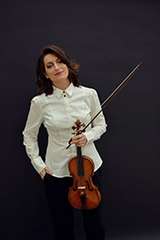|
Back
A vibrant welcome Toronto
Koerner Hall
09/21/2017 - & September 22, 23, 24*, 26, 2017
George Frideric Handel: Concerto a due cori in F Major, HWV 333
Arcangelo Corelli: Concerto grosso in C Major, Op. 6, No. 10
Antonio Vivaldi: Concerto for violin in G Minor, Op. 8, No. 2 (“Summer”) from “Le quattro stagioni” – Concerto con molti strumenti in F Major, RV 569
Jean-Philippe Rameau: Suite from “Les Boréades”
The Tafelmusik Baroque Orchestra, Elisa Citterio (music director)

E. Citterio (© Monica Cordiviola)
“A Joyous Welcome” was the title of this program as the Tafelmusik Baroque Orchestra welcomed its new music director, Elisa Citterio, whose unenviable task is to replace the much loved and respected Jeanne Lamon, the orchestra’s leader for 31 years. If this concert is anything to go by, the orchestra has a future characterized by renewed vibrancy and panache.
The opening piece, Handel’s Concerto a due cori, the cori being choirs of wind instruments - thus a concerto grosso for strings plus two groups of winds. The unusual work requires four horns; valveless “hunting” horns were used. (There were a few blatty moments, but that’s part of the fun.) Handel composed three such works as intermission features for his triumphant oratorios of 1747/48 and this one opens with a <>I>Pomposo section, spacious and processional. The second movement, A tempo giusto, turns out to be a colourful rendering of “Lift up your heads” from Messiah. The final two movements were most fun, a racy Allegro ma non troppo in which the two wind groups seem to be dueling, then A tempo ordinario featuring giddy repartee between the two oboes.
For Arcangelo Corelli’s Concerto grosso the ensemble was reduced to its core strings and continuo. The work has the structure of a suite, with an opening Preludio of understated grandeur, then a bouncy Allemanda, then four more sections. There are many playful shifts in dynamics.
The first half ended with the familiar but always welcome “Summer” concerto from Vivaldi’s The Four Seasons. While the Handel and Corelli works gave lots of scope for Ms Citterio to show both the leadership and violinistic skills, the Vivaldi is a virtuosic showcase. But as it bounced along, it became clear that the ensemble have to do pretty much everything she does, but in unison. The performance created edge-of-the-seat excitement and was greeted with shrieks of delight. (Really! - and well-earned.)
By the way, the performance of “Summer” was most appropriate because, even though fall has officially started, Toronto is experiencing the first (and hopefully last) heat wave of the year. Vivaldi’s other three seasons will appear, one by one, in later programs.
Vivaldi’s Concerto con molti strumenti is another violin concerto but with the orchestra expanded to include the wind instruments. The opening Allegro had the horns playing a galloping fanfare; this is succeeded by a limpid Grave movement. The finale, another Allegro has an episode for the two cellists, and served as a showcase once again for a huge variety of sounds from the winds.
The concert’s finale was a true party piece, a 13-movement suite from Rameau’s final opera Les Boréades which scintillated from its Ouverture to the hectic concluding Contredanses très vives. A highlight was the Entrée de Polymnie, the muse of sacred poetry; here was a graceful procession with no hint of the pomposo, while the Entracte: Suite des vents was picture music extraordinaire. The riotous applause earned a repeat of the jaunty penultimate movement, Airs gay.
There is an old metaphor of a classical performance being like walking a tightrope while mending a watch, and this kind of intricacy was on full display. While it sounds potentially nerve-wracking, the players were obviously enjoying themselves and this enjoyment was infectious. It was one of the most delightful orchestral concerts I have ever heard from Tafelmusik.
Michael Johnson
|